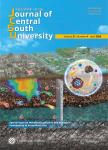Self-adaptive learning based immune algorithm
Self-adaptive learning based immune algorithm作者机构:Department of Computer Engineering&ScienceNanjing University of Aeronautics&Astronautics Science and Technology on Electron-optic Control Laboratory
出 版 物:《Journal of Central South University》 (中南大学学报(英文版))
年 卷 期:2012年第19卷第4期
页 面:1021-1031页
核心收录:
学科分类:12[管理学] 1201[管理学-管理科学与工程(可授管理学、工学学位)] 081104[工学-模式识别与智能系统] 08[工学] 0835[工学-软件工程] 0811[工学-控制科学与工程] 0812[工学-计算机科学与技术(可授工学、理学学位)]
基 金:Project(2010ZC13012) supported by the Aviation Science Funds of China
主 题:immune algorithm multi-modal optimization evolutionary computation immtme secondary response self-adaptivelearning
摘 要:A self-adaptive learning based immune algorithm (SALIA) is proposed to tackle diverse optimization problems, such as complex multi-modal and ill-conditioned prc,blems with the high robustness. The SALIA algorithm adopted a mutation strategy pool which consists of four effective mutation strategies to generate new antibodies. A self-adaptive learning framework is implemented to select the mutation strategies by learning from their previous performances in generating promising solutions. Twenty-six state-of-the-art optimization problems with different characteristics, such as uni-modality, multi-modality, rotation, ill-condition, mis-scale and noise, are used to verify the validity of SALIA. Experimental results show that the novel algorithm SALIA achieves a higher universality and robustness than clonal selection algorithms (CLONALG), and the mean error index of each test function in SALIA decreases by a factor of at least 1.0×10^7 in average.



